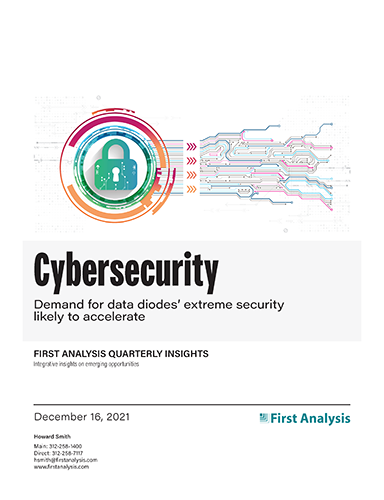Quarterly insights: Cybersecurity
Demand for data diodes’ extreme security likely to accelerate

Trends and challenges around cybersecurity, critical infrastructure and industrial assets mean there is a growing number of situations where data diodes – network hardware devices that use the laws of physics to ensure a one-way data flow – will be optimal cybersecurity solutions.
The decision on whether to use data diodes is typically driven by an assessment of the value of precluding either inbound or outbound data flow versus certain inefficiencies, limitations and costs inherent in using data diodes.
While we don’t foresee a major inflection point for data diode demand in the near term, we do foresee an eventual tipping point where cost reductions, expanded protocol support and creative solutions to management challenges aggregate to substantially eliminate the tradeoffs for a much broader range of applications and make data diodes a compelling choice.
We highlight four data diode vendors that target a variety of constituents in the market.
TABLE OF CONTENTS
Includes discussion of BAE Systems (LSE:BA) and three private companies
- Data diodes – a one-way street for data becoming more compelling
- Two primary use cases
- Trade offs of using data diodes are diminishing
- Some leading data diode technology providers
- Data diodes: No longer so extreme
- Cybersecurity index loses steam but remains ahead of Nasdaq, S&P 500
- Q4 cybersecurity M&A activity pace exceeds recent quarters
- Q4 cybersecurity private placement pace in line with recent quarters
Data diodes – a one-way street for data becoming more compelling
Society and the economy have benefitted immensely by connecting industrial assets and critical infrastructure to a broad range of distributed constituencies, and we think these connections will only grow as they enable more efficiencies and new opportunities to create value. At the same time, more connections mean more assets and infrastructure are exposed to attacks by malicious organizations and governments who use increasingly sophisticated tools and approaches to circumvent traditional cybersecurity defenses. A factor compounding this threat is that most traditional cybersecurity solutions were created for and are primarily used in environments with computing devices that use a small set of standard and well-known communication protocols and operating systems; by contrast, the world of industrial and infrastructure connections features a much more diverse range of protocols and operating systems that many traditional cybersecurity solutions don’t adequately address.
Given these trends and challenges, we believe there is a growing number of situations where data diodes, perhaps integrated with or combined in innovative ways with traditional software-based firewalls as well as non-diode hardware-based firewalls, will be optimal cybersecurity solutions. Data diodes are network hardware devices that use the laws of physics to ensure a one-way data flow. In a data diode, a transmitter converts data to a protocol, usually pulses of light, which is directed over a small gap to a receiver that can recognize the light signals. The receiver reassembles the data in its original form, or sometimes in a new protocol, for further transmission to other computer systems. Since the receiver is not physically connected to the transmitter and since the receiver can only receive (it has no ability to generate light signals and lacks other transmission capabilities) and the transmitter can only transmit (it has no light receptors or other receiving capabilities), there is no possible return path for data within the device.

Request full report
To access the full report, please provide your contact information in the form below. A First Analysis representative will follow up with you shortly. Thanks for your interest in First Analysis research.
